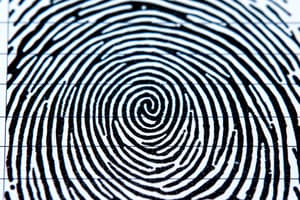Podcast
Questions and Answers
What type of prints can provide unique patterns for criminal identification?
What type of prints can provide unique patterns for criminal identification?
- Shoe prints
- Earprints (correct)
- Latent prints
- Footprints
Which technique is best for developing latent prints on porous surfaces?
Which technique is best for developing latent prints on porous surfaces?
- Powders
- Ninhydrin (correct)
- Iodine Fuming
- Cyanoacrylate
What is the main purpose of the Automated Fingerprint Identification System (AFIS)?
What is the main purpose of the Automated Fingerprint Identification System (AFIS)?
- To store shoe prints
- To analyze bite marks
- To provide eye identification
- To store and retrieve fingerprints (correct)
Which of the following best describes latent prints?
Which of the following best describes latent prints?
Which method produces temporary yellow-brown prints on porous materials?
Which method produces temporary yellow-brown prints on porous materials?
What does the principle of individuality in fingerprints imply?
What does the principle of individuality in fingerprints imply?
Which of the following fingerprints patterns is characterized by a smooth rise in the center?
Which of the following fingerprints patterns is characterized by a smooth rise in the center?
When do fingerprints typically form?
When do fingerprints typically form?
Why are fingerprints considered individual evidence?
Why are fingerprints considered individual evidence?
What is one method used to obtain fingerprints?
What is one method used to obtain fingerprints?
Which of the following statements is true about the permanence of fingerprints?
Which of the following statements is true about the permanence of fingerprints?
What distinguishes a radial loop from an ulnar loop?
What distinguishes a radial loop from an ulnar loop?
Which type of fingerprint pattern has circular ridges?
Which type of fingerprint pattern has circular ridges?
What characteristic allows fingerprints to be reliable for identification purposes?
What characteristic allows fingerprints to be reliable for identification purposes?
What is ridgeology primarily concerned with?
What is ridgeology primarily concerned with?
Which type of fingerprint pattern is the most common?
Which type of fingerprint pattern is the most common?
What are minutiae in the context of fingerprint analysis?
What are minutiae in the context of fingerprint analysis?
What method does iodine utilize to reveal fingerprints?
What method does iodine utilize to reveal fingerprints?
How does AFIS benefit forensic investigations?
How does AFIS benefit forensic investigations?
Which type of minutiae is NOT commonly analyzed for fingerprint identification?
Which type of minutiae is NOT commonly analyzed for fingerprint identification?
How are fingerprints typically recorded for analysis?
How are fingerprints typically recorded for analysis?
What is the minimum number of similarity points US courts often look for to establish a match?
What is the minimum number of similarity points US courts often look for to establish a match?
What role do latent prints play in investigations?
What role do latent prints play in investigations?
What type of fingerprint pattern rises upward in the middle and is the least common?
What type of fingerprint pattern rises upward in the middle and is the least common?
Which type of print is NOT typically used for linking an individual to a crime scene?
Which type of print is NOT typically used for linking an individual to a crime scene?
Which of the following methods reveals fingerprints by reacting with salt in sweat?
Which of the following methods reveals fingerprints by reacting with salt in sweat?
What is the purpose of using powders for fingerprint development?
What is the purpose of using powders for fingerprint development?
Which biometric print is not considered unique to individuals?
Which biometric print is not considered unique to individuals?
What describes an accidental fingerprint?
What describes an accidental fingerprint?
Study Notes
Fingerprint Basics
- Every fingerprint is unique, even identical twins have different prints
- Fingerprints never change, they remain the same throughout life
- Fingerprints can be categorized into three main patterns: arches, loops, and whorls
- Fingerprints develop in the womb due to fetal movement and environmental pressure
Fingerprint Purpose
- Fingerprints are a reliable way to identify individuals
- They can be used in forensic identification
- They can be found on various surfaces like glass, metal, and fabric
Fingerprint Properties
- Fingerprints cannot be permanently removed because the ridges regenerate if the outer layer is damaged
- Fingerprints are individual evidence, meaning they can link a person to a specific location
Fingerprint Classification
- Arches
- Plain Arch: Smooth rise in the center
- Tented Arch: Sharp upthrust in the center
- Loops
- Ulnar Loop: Loop opens towards the little finger
- Radial Loop: Loop opens towards the thumb
- Whorls
- Plain Whorl: Circular ridges
- Central Pocket Whorl: Loop with a central circular ridge
- Double Loop Whorl: Two loops intertwined
- Accidental Whorl: Doesn't fit into other categories
Fingerprint Applications in Investigations
- Fingerprints can be used to identify individuals and link them to crime scenes
- They are valuable physical evidence
Ridgeology
- Ridgeology is the study of unique ridge patterns on fingers
- It focuses on analyzing ridges, valleys, and minutiae for identification
Minutiae
- Minutiae are points where the ridge structure of a fingerprint changes
- These changes are unique and can be used to identify individuals
- The number of points accepted as a match varies, but many US courts require 8-12 points
- Common minutiae points include ridge endings, islands, bridges, lakes/enclosures, deltas, forks, dots, and spurs
Automated Fingerprint Identification System (AFIS)
- AFIS is a digital system used to store, search, and compare fingerprints
- It speeds up the process of identifying suspects by matching prints to those on record
Other Types of Prints
- Palm prints, footprints, and lip prints can also be used for identification
- These prints can be used to link a suspect to a crime scene
Latent Prints
- Latent prints are invisible to the naked eye
- They are created by the transfer of oils from fingers to surfaces
- They can show someone was at a crime scene
Latent Print Development Techniques
- Powders/Dusting: Powders stick to oils in fingerprints, making them visible
- Iodine: Iodine fumes react with oils, showing prints on paper
- Ninhydrin: Turns prints purple by reacting with sweat on paper
- Silver Nitrate: Reacts with salt in sweat to show prints under UV light
- Cyanoacrylate: The fumes stick to prints, making them white on surfaces like glass or plastic
Automated Fingerprint Identification System (AFIS)
- AFIS is a system that allows for storing and searching fingerprints
- It can be used to compare single prints from crime scenes to those on record
- AFIS has evolved into IAFIS, which is an international fingerprint database
Studying That Suits You
Use AI to generate personalized quizzes and flashcards to suit your learning preferences.
Related Documents
Description
Explore the unique world of fingerprints with this quiz that covers their properties, purposes, and classification methods. Learn about the distinct patterns like arches, loops, and whorls, and understand why fingerprints are a reliable form of identification. Test your knowledge on how fingerprints develop and their forensic significance.




